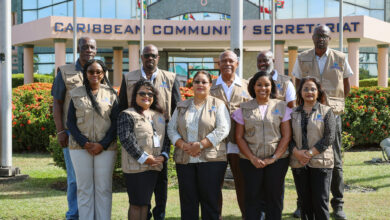Right Honourable Owen Arthur, Prime Minister of Barbados and Chairman of the Conference of Heads of Government of the Caribbean Community
The Honourable Patrick Manning, Prime Minister of Trinidad and Tobago, and Host Prime Minister
Your Excellency the President of Suriname Other Members of the Conference of Heads of Government of the Caribbean Community
Honourable Ministers
The Honourable Sir George Alleyne, OCC. Chancellor of the University of the West Indies, and Heads of Other Regional Organisations
Other Distinguished Participants
Representatives of the Media
Ladies and Gentlemen
As Secretary-General of the Caribbean Community, it is my distinct pleasure to address this historic summit of the Heads of Government of the Caribbean Community on Chronic Non-Communicable Diseases (NCDs).
At the outset, I must pay tribute to one of the towering Caribbean figures whose contribution to the regional integration process was sterling and one whose commitment was unswerving. The late Sir John Compton OCC was taken away from us on Friday, 7 September 2007. I know I speak for the entire Caribbean Community when I extend heartfelt condolences to Lady Janice and the Compton family and to the Government and people of Saint Lucia.
But it is said that the Lord giveth and the Lord taketh. Today we are happy to welcome to the highest councils of the Caribbean Community, the Honourable Bruce Golding, the new Prime Minister of Jamaica. Welcome Honourable Prime Minister. Mine is the first of many such welcomes. All look forward to the sterling contribution expected of you. To whom much is given, much is expected.
Heads of Government, through this Summit – on Chronic Non-Communicable Diseases (NCDs) – you are demonstrating your firm commitment to the improvement in the quality of life of the people of the Caribbean Community. In so doing, you are giving true substance to the Declaration you adopted at your 2001 Meeting in Nassau, The Bahamas that The Health Of The Region is The Wealth Of The Region. In convening this significant event, you have therefore affirmed that commitment in this first ever CARICOM Summit on the important issue of the NCDs.
But you have done more. The health of the Region – and thus its true wealth – is seriously threatened. This emerges from the fact that the Region is not only second to Sub-Sahara Africa, in the incidence of HIV/Aids but is also reputed to have the worst prevalence of deaths in the Americas, resulting from NCDs. You are therefore, tackling one of the greatest threats to the improvement in the quality of life of the people of the Region. Furthermore, in so doing you are also safeguarding the future development of our Region, for as a recent research study on India has shown “a sharp rise in lifestyle diseases, such as heart problems and strokes coupled with the lack of adequate preventive health care threatens future growth prospects”.
Underlying Philosophy: The Health of the Region is the Wealth of the Region
The Nassau Declaration, designed to accelerate the response to a variety of health conditions facing the Region, identified the Pan Caribbean Partnership Against HIV/AIDS (PANCAP) and the Caribbean Cooperation for Health (CCH) as the two pillars for charting the implementation of the undertakings in that Declaration. We all know that the Pan Caribbean Partnership against HIV/AIDS inaugurated in 2001, has matured into a full fledged network of countries, institutions, private sectors, NGOs and other development partners such as CIDA, USAID, DFID, KFW and KZW and the UN system. In the process, PANCAP has been hailed as “an international best practice.”
We at the CARICOM Secretariat fully recognize the value and impact of this network, since the PANCAP Coordinating Unit is located in the Directorate of Human and Social Development. And, given the inter-sectoral nature of the disease, much of the implementation of its programmes is carried out in collaboration with the health, education, youth, culture, gender and sport programmes. Moreover, much of this work is also being implemented together with our regional institutions, among them CAREC, CRN+, CHRC, UWI and PAHO.
This concept of partnership is vital and in this context, I wish to take this opportunity to express profound gratitude to the Pan American Health Organisation (PAHO), the Government of Canada, the Canadian Public Health Association and the Commonwealth Secretariat for their support for this Summit.
The Caribbean Commission on Health and Development as a Catalyst
The Caribbean Cooperation in Health (CCH), the other pillar for charting the implementation of the undertakings of the Nassau Declaration, was inaugurated in the early 1980s and has now entered a third phase in 2007. It places emphasis on NCDs, mental health and strengthening of the public health institutions and leadership in the Region. Regrettably, the CCH has floundered due to lack of resources for its programmes. This must change for the obvious reason that, as the working document shows, chronic conditions claimed twice as many lives as all infectious diseases, including HIV and AIDS in 2005, the latest year for which universal statistics are available.
Fortunately, the mandate for the CCH has been given a major fillip by the seminal work of the Caribbean Commission for Health and Development, chaired by the Honourable Sir George Alleyne OCC. The Commission’s Report presented to the Twenty-Seventh Meeting of the Conference of Heads of Government in July 2006 in St Kitts and Nevis, placed in stark relief the link between health and economic development. Drawing information from a wealth of data and analyses, the Commission’s Report made quite clear, the deleterious social and financial consequences of the NCDs to our Caribbean countries. It was that Report that made us more aware that the increasing burden of the NCDs threatens to overwhelm our already overstretched health services and that the solutions revolve around primary prevention, based on a comprehensive programme as the most cost-effective approach for containing this emerging epidemic. Really we need a regional approach – a true manifestation of functional co-operation.
The Regional approach: a manifestation of functional cooperation
Ladies and Gentlemen, it is significant that the sixth of the ten Millennium Development Goals, to which we have all subscribed, lists HIV/AIDS, malaria and tuberculosis – all infectious diseases – but omits combating chronic diseases as part of its universal framework for development. This is obviously due to the erroneous distinction between illnesses of affluence and illnesses of poverty.
The presentations by our Lead Prime Minister for Health the Honourable Dr. Denzil Douglas, Prime Minister of St Kitts and Nevis and the panel of experts will deal with these technical details. I wish to focus only on the implications for policy.
Consolidating Regional Health Institutions as a response to combating NCDs
To that end, already you, our Heads of Government, at your Conference in Barbados in July 2007, signaled your appreciation of the need for collaboration and sharing of Health Services, when you approved the bringing together of the Caribbean Regional health Institutions (CAREC, CFNI, CEHI, CDERA and CHRC) under one Caribbean Regional Public Health Authority. In moving toward this consolidation, the Community is grateful for the technical assistance and collaboration with PAHO/WHO.
Placing emphasis on prevention
Secondly, in its official statement made on the occasion of World No Tobacco Day 2007, the WHO recommended that data on the respective diseases should be included in the surveillance process to be used in policy dialogue and decision-making. From a primary preventive perspective, surveillance of the risk factors known to predict the disease as an important starting point must be recognised. However, in our Region, secondary and tertiary prevention require no less attention because countries are already using a lot of resources in these areas. Furthermore, performance of national health systems are often judged by the population on how well or otherwise countries can provide these.
The challenge of this Summit, therefore, is to come up with a blue print for an integrated prevention strategy targeting the three main risk factors: unhealthy diet, physical inactivity and tobacco use. The Working Document prepared for this Summit reveals the magnitude of the challenge we face. But I am of the view that this is not insurmountable. Never forget that about 25 -30 years ago, when we in the Caribbean faced similar challenges, by working together we became the first Region in the world to eradicate polio and measles. Prime Minister Douglas at the UN General Assembly Special Session in June 2006 enunciated the intention of the Caribbean to be among the first region in the World to achieve Universal Access to prevention, care and treatment of HIV/AIDS. (We can’t let him down!)
Uniting to stop the epidemic
In closing therefore, let us follow these examples and take bold steps forward. In this respect, we need the continued committed leadership of our Heads of Government, and the full participation of the stakeholders at the national and regional levels and the support of our development partners.
Distinguished Heads of Government, esteemed participants, representatives of the media, let us all seize this opportunity to leave a legacy of a healthier Region, by making this historic Summit, memorable for setting in motion the structure by which we not only stem the tide but truly Unite to stop the epidemic of Non-Communicable Diseases in the Region.
Finally, let us thank the Honourable Prime Minister, the Government and people of Trinidad and Tobago for generously agreeing to host this landmark event in the history of the Caribbean Community.





